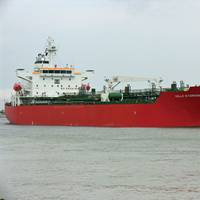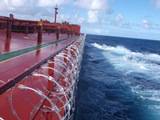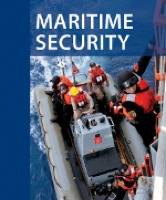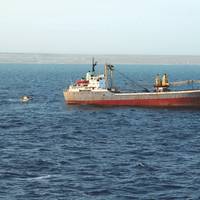Ambrey, Inchcape Shipping Services Join Forces

Ambrey and Inchcape Shipping Services (ISS) announced a strategic partnership aimed at transforming safety and security in the maritime sector.Through this partnership, Ambrey and Inchcape will jointly offer a comprehensive range of services via Inchcape's Survey & Inspection Department, led by Vice President Chris Greenwood, including Citadel Inspections, Ship Security Assessments, Anti-Piracy Ship Security Assessments, Ship Security Plan Reviews, and Port Security Assessments on various projects worldwide.In turn…
Maritime Recordkeeping is Serious Business

In addition to fuel, modern ships also run on paper or their electronic equivalent. Vessels are required to keep written or electronic records of many things – and the list is growing.There is the traditional Ship’s Log, which records the vessel’s position, course, speed, weather, and unusual events to name a few. The Oil Record Book (ORB) has been around for a long time and tracks all movement of oil throughout the vessel, including its loading, consumption, and discharge (generally via the oily water separator and overboard discharge piping).
New Ship Security Officer Training
Rood Boven Groen has increased its training portfolio by adding the third security training: Ship Security Officer according to STCW’78 including the 2010 Manila amendments. This course has been recently approved by the Netherlands Shipping Institute. Last year the IMO training Security Awareness and Designated Security Duties conducted by Rood Boven Groen were approved as well. These two trainings are included in the Ship Security Officer course as per IMO specifications. Rood Boven Groen included many practical exercises using the Ship Security Plan and de ISPS Code to make the dry matter easier digestible. The participants described the course as ‘lively’, ‘educational’ and ‘fun’.
US Conditions of Entry for Vessels from Nigeria
The U.S. Coast Guard (USCG) has announced that it will impose conditions of entry on vessels arriving from the Federal Republic of Nigeria (excluding vessels arriving from certain ports) with effect from June 26, GAC reported in its daily Hot Port News Report. The USCG is authorised to impose conditions of entry on vessels arriving in U.S. waters from ports that it has not found to maintain effective antiterrorism measures. Ports in the Federal Republic of Nigeria were found to not be maintaining effective anti-terrorism measures, with certain exceptions. Beginning June 26, 2014, the below conditions of entry will apply to any vessel that visited a non-excepted Nigerian port in its last five port calls.
Maritime Security handbook: Stowaways by Sea
Improvements in security have not reduced the number of stowaways or the number of incidents and it is seafarers who have to cope with the extra work, delay, uncertainty and possible violence. This is why The Nautical Institute has today (Wednesday, April 9, 2014) launched Maritime Security handbook: stowaways by sea, aimed at helping people who have to deal with stowaways by giving advice on the preparation and training that is needed both onboard and ashore. The handbook gives practical guidance on making a vessel secure against stowaways, managing any that have succeeded in getting onboard, collecting the necessary evidence and organising the repatriation process.
Product Tanker Hijackings

Gulf of Guinea piracy presents a radically different picture compared with Somali piracy. Since decades it has been a kaleidoscopic mix of short duration hijackings, militant disruptions, kidnappings, robberies and thefts, depending on the location and the setting. It was not until recently, however, that piracy in the region attracted significant international media attention due to the increase in hijackings of product tankers in the region. It is uncertain when this phenomenon started exactly…
Videotel Security Training MCA Approved

Videotel has been granted MCA approval on a new training suite designed to meet the forthcoming STCW rules on Ship Security Training. From January 1, 2014, security training will fall into three categories, in that all seafarers must demonstrate an understanding of the security threats to their vessels whatever their role. Prior to this, security related training was a requirement only for the Ship Security Officer. The Videotel Ship Security Officer course, which complies with STCW Reg. VI/5 Sect.
Security Awareness en Designated Security Duties
As one of a few training institutes in the Netherlands, Rood Boven Groen has been certified by ILT to teach the new IMO recognized training Security Awareness en Designated Security Duties according to STCW’78 including the 2010 Manila amendments. After successful completion of the course the participants will receive the certificate for either Security Awareness or Designated Security Duties. From the January 1, 2014 both certificates are compulsory for all crew on ships sailing under the ISPS Code. From November 5-8, 2013, Rood Boven Groen offers the course Security Awareness training for the first time in combination with the basic safety training in Enkhuizen (The Netherlands). This is the basic, minimum training for all seafarers.
Armed Private Security Guards: Malta-flag Issues Advisory
Shipping Notice 106 to owners of ships registered in Malta is outlined here as an example of one flag-state's action to control the use of private guards. The shipping notice advises that all applications to carry Privately Contracted Armed Security Personnel (PCASP) shall be accompanied by a Voyage Plan and Crew List for the duration of the stay of the PCASP onboard. ii. the provisions of these circulars and shipping notices have been considered and applied: a. MSC.1/Circ.1405/Rev.2; b. MSC.1/Circ.1339; c. Merchant Shipping Notice 71; d. iii. iv. vi. vii. viii. the PCASP are: a. qualified for providing the service for which they are being engaged; b. qualified in the use of the firearms being taken onboard; c. ix.
New Maritime Security Book Published

The Nautical Institute publish a guide to making a vessel truly secure with a security culture that works both onboard & ashore. Written by Steven Jones MSc BSc (Hons) MNI, Maritime Director of the Security Association for the Maritime Industry (SAMI), the book examines the threats to maritime trade, and to specific ship types, before discussing in detail how the ISPS Code came into being and its underpinning principles and requirements. Subsequent chapters focus on the practicalities of security planning…
Stowaways Choose to Hide Between a Rock & a Hard Place
The American P&I Club warns again that stowaways continue to hide in the ship's rudder stock recess. The P&I Club advise its members that stowaways wait in port areas until after dark and then swim to the rudder stock, climbing it and hiding inside the recess. Having gained access to an external area of the vessel, they cannot then be easily found by the ship’s crew. It has been observed that most of these vessels come from Africa in ballast and, for that reason, the rudder stock recess stays above water. However, as the vessel rolls and pitches, the stowaways are exposed to the sea. Members are advised to take all necessary measures as part of the Ship Security Plan (SSP) in accordance with the International Ship and Port Security (ISPS) Code compliance requirements.
Ensuring There are No Hiding Places for Stowaways

The problem of stowaways hiding in a ship’s rudder stock recess, especially at African ports, still persists, the American Club has warned its members. They are urged to take proper precautions to prevent stowaways from boarding and hiding themselves in this manner. The club first alerted its members to this practice in April 2004. The cunning stowaways wait in port areas until after dark and then swim to the rudder stock, climb it and hide inside the recess, making it difficult for the ship’s crew to find them.
USCG Port Security Advisory for Libya
The U.S. Coast Guard, in light of civil unrest in Libya, issued a Port Security Advisory for Libya March 11, suggesting security measures for ships to take when calling upon Libyan ports. Civil unrest in Libya has prompted U.S. government concerns regarding whether port facility requirements of the International Ship and Port Facility Security Code are still being executed and maintained. The U.S. Directly report the actions taken to the cognizant U.S. Coast Guard Captain of the Port prior to arrival at a U.S. port. "The current security situation in Libya's ports is unknown at this time,” said Coast Guard Rear Adm. Kevin Cook, director of Prevention Policy. Implementing the above recommended security measures will generally expedite vessel entry into the U.
Int’l Register of Shipping Opens Singapore Office
International Register of Shipping (IRS) has opened an office in Singapore. The office will be designated as a regional centre for the classification society and will offer a wide range of services. “Singapore is one the busiest ports in the world and with a free market economy and political stability, many shipping companies are making this their home,” said Julian Padilla, Chairman of the Board of International Register of Shipping. “We intend to be the preferred service provider to these companies. The office is staffed by marine engineers, naval architects, master mariners, marine oil and gas specialists, marine risk and security specialists, oil terminal specialists and quality/environment/safety and safety lead auditors.
Conditions of Entry, Arriving from Congo
The US Coast Guard issued a notice stating that, effective September 15, it will impose conditions of entry on vessels arriving to the United States from the Republic of the Congo, with the exception of vessels arriving from the Djeno Oil Terminal, a single buoy mooring off-shore, during their last five port calls. In summary, each affected vessel must: (1) implement the Security Level 2 measures from its ship security plan while in a Congolese port; (2) ensure that each access point is guarded and that guards have total visibility of the exterior of the vessel while in a Congolese port; (3) attempt to execute a Declaration of Security while in a Congolese port…
Cambodia – Conditions of Entry
(1) implement measures per the ship’s security plan equivalent to Security Level 2 while in the Cambodian port; (2) ensure that each access point to the ship is guarded and that the guards have total visibility of the exterior (both landside and waterside) of the vessel while in the Cambodian port; (3) attempt to execute a Declaration of Security while in the Cambodian port; (4) record all security actions in the ship’s log; and (5) report actions taken to the cognizant USCG Captain of the Port (COTP) prior to arrival in the United States. Based on the findings of the Coast Guard boarding or examination, the vessel may be required to…
Piracy and Armed Response on Ships

Modern day piracy, it seems, is rather like plugging a badly leaking pipe with one finger — just when you think you might have stemmed the flow from one area, another jet of water shoots out to hit you in the face. Even if some long-term solution is reached on this front, a more sinister and sustained outbreak of piracy (and militancy) has once again arisen in Nigeria. Increased threats to the oil industry (including on ship and offshore rig personnel) from well organized and armed militant groups in the Niger Delta have become more and more prevalent…
USCG Sets Conditions Indonesia Ships
The US Coast Guard issued a notice stating that, effective March 10, it will impose conditions of entry on vessels arriving from Indonesia. With the exception of vessels arriving from certain named ports, any vessel arriving in the United States that called in Indonesia during its previous five port calls must demonstrate the following: (1) that it implemented measures in accordance with the ship’s security plan equivalent to Security Level 2; (2) that each access point to the vessel was guarded and that the guards had total visibility of the exterior to the ship while in the Indonesian port; (3) that it attempted to execute a Declaration of Security…
Panama Approves Charge for ISSC Certificate
The Panama Maritime Authority (AMP) board of directors approved recently a $ 250 charge for issuing the International Ship Security Certificate (ISSC). All Panama-flagged vessels have to file a ship security plan, which is to be assessed by the Recognized Security Organization Phoenix Vessels Services Inc, selected as sole RSO by the AMP on August 12th for this purpose. An in-situ inspection of vessels, made by other Recognized Security Organizations accredited by the AMP, will follow the ships plans’ approval. The RSO recognized for verification purposes will issue the interim ISSC. Finally, the AMP will issue the five-year ISSC at a cost of US$250.
MCA Approves First Ship Security Plans
The United Kingdom’s Maritime & Coastguard Agency (MCA) has recently approved the first two Ship Security Plans for UK flagged vessels. It expects these to be the first of many before the implementation date of the International Ship and Port Facility Security Code (ISPS) on 1st July 2004. The first verifications of ships security systems have been scheduled for early November. The plan approved was for the vessel CMA – CGM Normandie. This has been carried out as a joint exercise between the operators of the vessel, Zodiac Maritime Agencies Ltd, and their security advisers, Maritime and Underwater Security Consultants (MUSC). Zodiac were pleased with the progress and are intending to implement the plan on board the vessel as soon as possible…
Legal Beat: At Sea with U.S. Maritime Security
By Dennis L. The U.S. Coast Guard issued its final regulations implementing the Maritime Transportation Security Act of 2002 (MTSA). These regulations replace the interim rules issued on July 1, 2003 and take into account comments received thereon. Few substantive changes, though, have been made. The majority of the changes are in the nature of clarifications. The submission date for security plans was changed from December 29 to December 31, 2003. Vessel and facility security plans must be in full effect not later than July 1, 2004. Various alternative security programs submitted by specialized industry groups were approved. Overall, the Coast Guard is to be congratulated for its development of a program for enhancing U.S.
IMO: Master May be SSO
The master of a ship can be designated as the Ship Security Officer (SSO) in implementing the provisions of the mandatory International Ship and Port Facility Security (ISPS) Code, IMO's Flag State Implementation (FSI) Sub-Committee has unanimously decided to recommend to the Maritime Safety Committee (MSC). The FSI Sub-Committee, which meets this week at IMO's London Headquarters, considered the issue following concerns raised by Contracting Governments to the 1974 International Convention for the Safety of Life at Sea (SOLAS) and by the shipping industry as to whether the ISPS Code, as drafted, would prevent the master of the ship being designated as the SSO. The ISPS Code will become mandatory in July of this year under amendments to SOLAS adopted in December 2002.
Maritime Security: Port Pile Up?
There are less than three months until July 1 ... Do you know where your International Ship Security Certificate (ISSC) is? If not, you are in grave danger of having your ship delayed or even denied entry into port in the United States and various other countries. The International Ship and Port Facility Security (ISPS) Code comes into effect on July 1 and full enforcement of the U.S. Coast Guard regulations under the Maritime Transportation Security Act (MTSA) also commences. Ships engaged in international commerce and port facilities that they utilize are required to have fully implemented relevant provisions by that date. Port states, particularly the United States, have announced plans to vigorously enforce the ISPS Code and related provisions as of that date.






